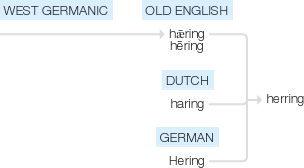Herring
Old English hǣring, hēring, of West Germanic origin; related to Dutch haring and German Hering .
wiktionary
From Middle English hering, from Old English hǣring, from Proto-West Germanic *hāring(“herring”), further etymology unknown. Possibly derived from Proto-Germanic *hērą(“hair”) + -ing, due to the similarity of their fine bones to hair. Cognate with Scots hering, haring(“herring”), Saterland Frisian Hiering, Häiring(“herring”), West Frisian hjerring(“herring”), Dutch haring(“herring”), German Low German Hereng, Hering(“herring”), German Hering(“herring”). French hareng, Norman ĥéren, Latin haringus, etc. are borrowings from Germanic.
etymonline
herring (n.)
north Atlantic food fish of great commercial value, Old English hering (Anglian), hæring (West Saxon), from West Germanic *heringgaz (source also of Old Frisian hereng, Middle Dutch herinc, German Hering), of unknown origin. Perhaps from a source related to or influenced in form by Old English har "gray, hoar," from the fish's color, or from the source of Old High German heri "host, multitude" in reference to its moving in large schools.
French hareng, Italian aringa are from Germanic. The Battle of the Herrings (French bataille des harengs) is the popular name for the action at Rouvrai, Feb. 12, 1492, fought in defense of a convoy of provisions, mostly herrings and other "lenten stuffe."
